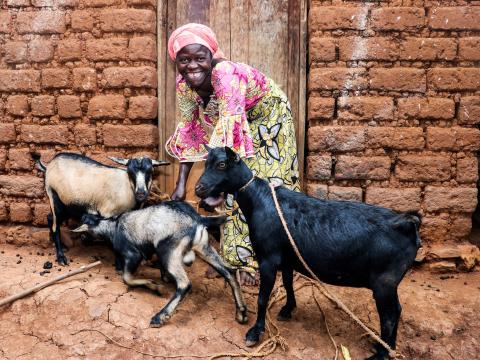The S4T approach is transforming the lives of children and women in Kalehe

By Jean Baptiste Mirindi, Senior communication Officer
In the evening shade of her house, 38-year-old Nzigire Maheshe smiles broadly when she visits her goats to check on the progress of one in gestation. A member of the Village Savings and Loans Association (S4T) for the past 2 years, she has been experimenting with goat breeding and has a small trade in ripe bananas.
Abandoned by her husband for more than 10 years due to a misunderstanding about the misuse of household income, Nzigire admits that her 4 children, left to her by her husband, started school late and often had to interrupt the school year due to lack of school fees. "My children begged for food, confused with street children, we were marginalized by everyone in the village," says Nzigire with emotion.
Nzigire M. was living a miserable life and no longer felt like working or living, with a heavy load on her shoulders and no source of household income. To meet her children's small needs, she decided to start a small commerce of ripe bananas, which enabled her to find money to save in S4T, of which she has been a member since 2019, but without any guidance on financial management.
In April 2021, Nzigire joined the Village Savings and Loans Association (S4T), set up by World Vision through its ANCP project, with the mission of supporting children's schooling in order to improve their education and increase the household economy.
With her courage and money she had saved, she was able to access to a credit of 150,000CF (65.2$ USD) in her S4T. She paid for a pregnant goat that gave birth three weeks later.
After repaying her loan and receiving training from ANCP project in financial management, empowerment and micro-project planning, Nzigire decided to take out another loan to strengthen her business and buy another goat. She was granted 220,000FC (95.6$ USD). After 3 months, she began to see changes in her business. "I saw the capital of my business increase, which meant I was earning an average of more than 50,000CF (21.7$ USD) a month," she confessed.
Thanks to this interest, she was able to start paying her children's secondary school fees and buy healthier food for their meals. " This was the end of my children's irregularities at school, it is certainly the strength of ANCP's support in the S4T component that the benefit is changing my life and that of my children," she admits.
A fighter woman, Nzigire paid her loan and decided to take out another 800,000CF (347.8$ USD) to buy a field next to her house with one million Congolese francs about 434.7$ USD in order to practice the agriculture. "I'm free because I've paid off my debt," she says.
On the other hand, Nzigire's happiness is to see her children active and courageous at school. Thanks to her hard work, she has succeeded in giving her children a better and more stable life than they could have hoped for without her devotion.
She has continued to help women in her community achieve financial success and independence. "I encourage my neighbors to join spontaneous VSLA groups, because I can no longer live without belonging to S4T," she concludes.
In the Democratic Republic of Congo, in the eastern part of South Kivu, in the sub-division of Kalehe I, Kalehe territory, World Vision, with financial support from the Australian Government Department for Foreign Affairs and Trade (ANCP), is implementing a project entitled "Access to inclusive quality education for girls and boys affected by the conflict in Kalehe territory". The project provides support to the education sector in this area and is being implemented in 30 primary schools. The overall aim of the project is to increase the school retention and attendance rate, as well as improving the academic results of 15,660 girls and 16,200 boys in thirty primary schools in this fragile context, for a total of 54,000 beneficiaries. The main objectives of the project are to improve the physical environment of schools in order to facilitate access and inclusion, and to improve the quality of education offered to children.